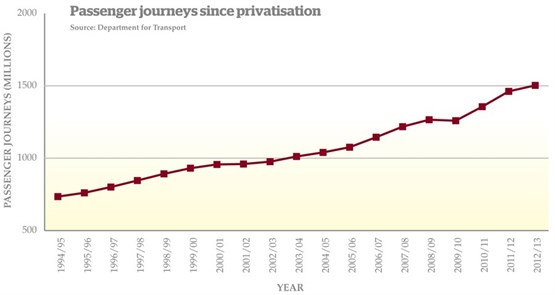In Griffiths’ view, abolition of the Strategic Rail Authority and absorption of its role into the DfT was a major mistake, and that while political sensitivities mean Government will also be heavily involved, much more of an arm’s length feel to rail management is needed.
He is of the view that the West Coast meltdown made even the DfT agree with this, having had its fingers burned so badly. He looks back now and is clearly frustrated at how difficult Government and industry have made things for each other in running the railways and planning their growing future.
“God knows how many times somebody has announced that we are going to have a rail review, or we are to tinker with this or do that. None of that helps. You want stability in any industry, you want the right policy, the right regulation. And if you have the right structure then you can go forward.”
So is that RDG’s job?
“Absolutely. We need to work to try and give the industry that stability, to capitalise on all the positive things that it has done over the last 20 years. Then figure how we can repeat that - and more - going forward.”
And with that we part company. A couple of weeks later I dine as planned with Griffiths, Roberts and Watson in an enjoyable and clear demonstration of peace and harmony between RSG and RDG. They clearly do ‘get on’ and obviously are working together in the name of good all round. That‘s reassuring to see.
But you cannot airbrush history: RSG was born from the fury of the suppliers at being left out of RDG, and its midwife was (as I see it) a DfT which made very clear to RDG that it wanted the supply chain involved, and that they’d jolly well better go and find a way to make this happen if they wanted a balanced and constructive dialogue. I certainly did not imagine the supply chain fury at their exclusion from RDG, all of which suddenly evaporated with the formation of RSG and the embracing thereof by RDG.
In due course, it’s blindingly obvious that RSG and RDG should become RDSG, and maybe this will happen first in day to day work, and then more formally with a merger of the organisations themselves. Frankly, as long as the big constructive conversation takes place, it doesn’t concern me overmuch. It’s the outcome that matters. I wish them all well.
Certainly, Griffiths and Watson are a highly impressive pair, and Alstom and Stagecoach are to be congratulated for proving the naysayers wrong and allowing their expensive top executives to work for a wider industrial benefit and not narrow strictly shareholder interests. Long may that continue - and spread as a principle to other companies.
RDG has therefore made great strides, but its output remains patchy and inconsistent. Ironically, it is at its best when not much is happening and it tackles the long overdue educational aspect of PR that the industry has woefully neglected to its very great cost.
I hope it develops this aspect of its operations significantly and rapidly. This was clearly understood by the public relations departments of the pre-war ‘Big Four’ companies of the last private railway era, and it is a skill we need to re-embrace quickly and deeply. It could play a key role in drawing the sting from frequently critical media coverage.
And while I absolutely believe the gutsy Griffiths when he says he has the cojones to take on Government when necessary, the organisation beneath him needs to catch up and do likewise.
Fare increases
As this new journal prepared for press, the Government capped fare increases at RPI rather than RPI+1%, and new Rail Minister Claire Perry played to the crowd and cosied up to Labour traditionalists in a predictable and rather boring statement that South Eastern commuters deserved the much better deal she was “determined” to provide, and that the evil of overcrowding should end and that TOCs would be made to do better. We’ve heard all this playing to the gallery before.
And what did RDG say in its press release?
It “welcomed” the “good news” for passengers on fares, but failed to hammer home that the higher increase the Government had scrapped was its own policy, not that of the TOCs. The press release failed to mention the Government’s abolition of the flex mechanism that TOCs had so cynically abused over the past few years, and likewise steered clear of pointing out that overcrowding was a direct result of strict Government control of how many carriages the TOCs can have.
It would seem there’s still some way to go before RDG really does come across as a fearless CBI-style body. But let’s not to be too chippy… it’s early days yet, and Griffiths has only been in the post a half year or so. He’s making progress - slowly.
Change always comes too slowly, however, usually when it’s most needed. Griffiths must keep the pressure on and make sure that the changes he’s driving continue to come steadily, if not rapidly.













